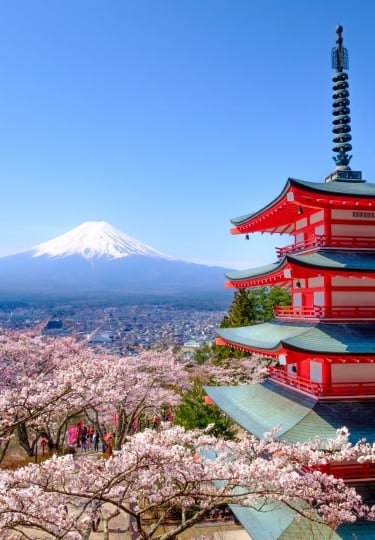With one of the longest and most complex histories of any country on earth, Japan’s colors, sights, and traditions have fascinated visitors for thousands of years. As a country, it’s a fascinating look at old-meets-new; Japan holds strong to its traditions and roots while still making room for innovation and new trends.
Japan is known for everything from onsen hot springs and kabuki baths (dating to the 6th and 16th centuries, respectively) to all-night neon-lit dance parties, anime, and sushi boat restaurants, all of which are decidedly more modern.
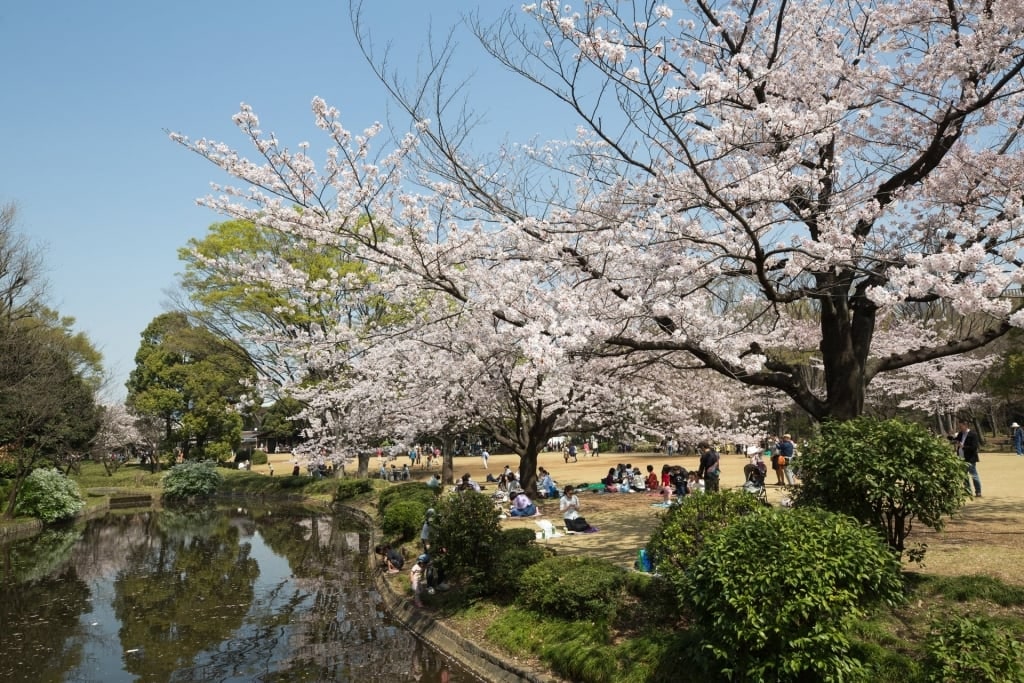
Kitanomaru Park, Tokyo
In addition to culture, arts, and food, Japan is one of the world’s most beautiful island chains. Massive mountainscapes and lakes dominate the landscape in the inner part of Honshu, the main island, while the coastal areas are dotted with beautiful beaches, bamboo forests, and elaborate gardens filled with cherry trees.
Use this list of things that Japan is known for to help you build excitement for visiting one of the most culturally rich destinations in the world.
Temples
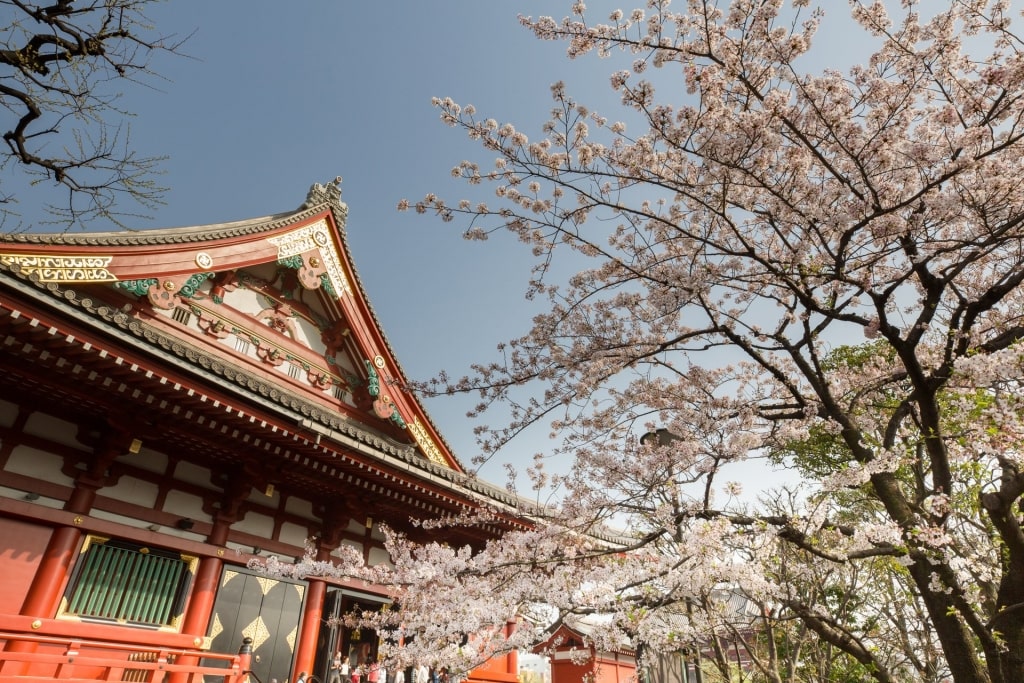
Sensoji Temple, Tokyo
Japan is famous for its numerous, intricately designed temples. Even the smallest village will have a temple in front, and many homes have their own temples, too.
Most of the famous temples in Japan are far more than just one building. Usually, there’s an inner temple, which will have a designated area for worship and may not be open to the public. Along with the inner temple, most temple complexes include several buildings, gates flanked by protective statues, beautiful gardens, and pagodas and ponds. You could easily spend a few hours exploring some of the country’s largest temples, like those around Nara (near Osaka) or Kyoto’s Todai-ji.
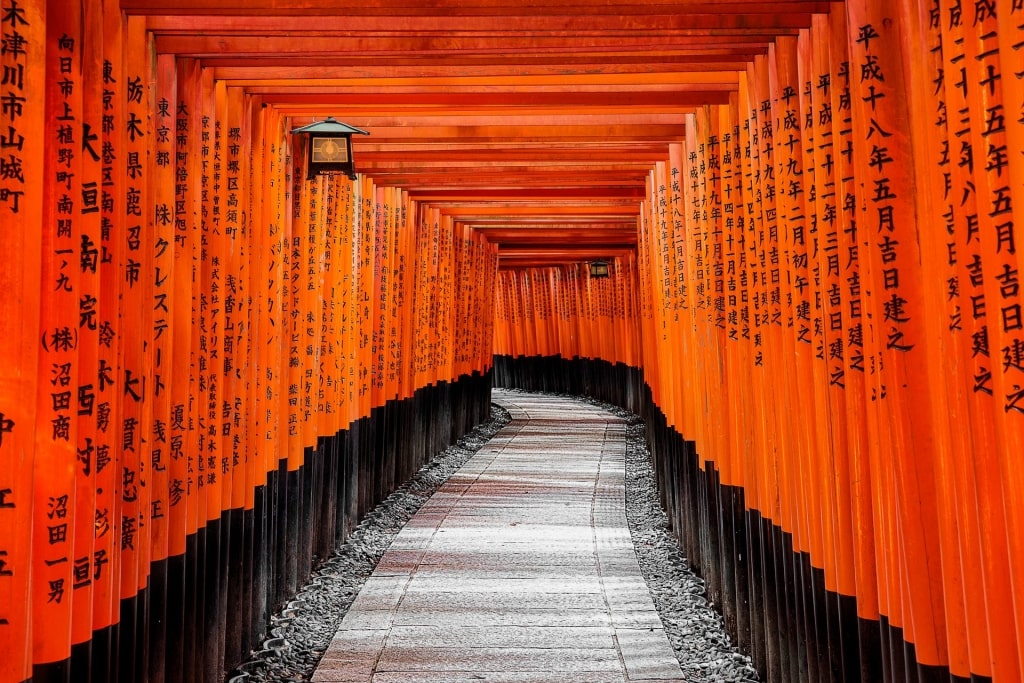
Tunnel of Torii Gate in Fushimi-inari Taisha, Kyoto
There are many different religions and religious sects in Japan. In Kyoto, which has more than 2,000 temples alone, one of the most beautiful sights is the Fushimi-inari Taisha temple, a huge complex most famous for its path through the Tunnel of Torii Gate. It’s a Shinto temple (which is actually referred to as a shrine).
It’s easy to tell the difference between a Shinto shrine and a Buddhist temple, even from afar. Aside from the fact that Buddhist temples will usually have a Buddha in a place of honor, Shinto shrines tend to feature the color red and often have animal-themed statues guarding the gates. Buddhist temples have human-esque warrior figures, called Nio, that protect their gates. Two good examples of this are the Nio outside Shitennoji Temple in Osaka.
Sake
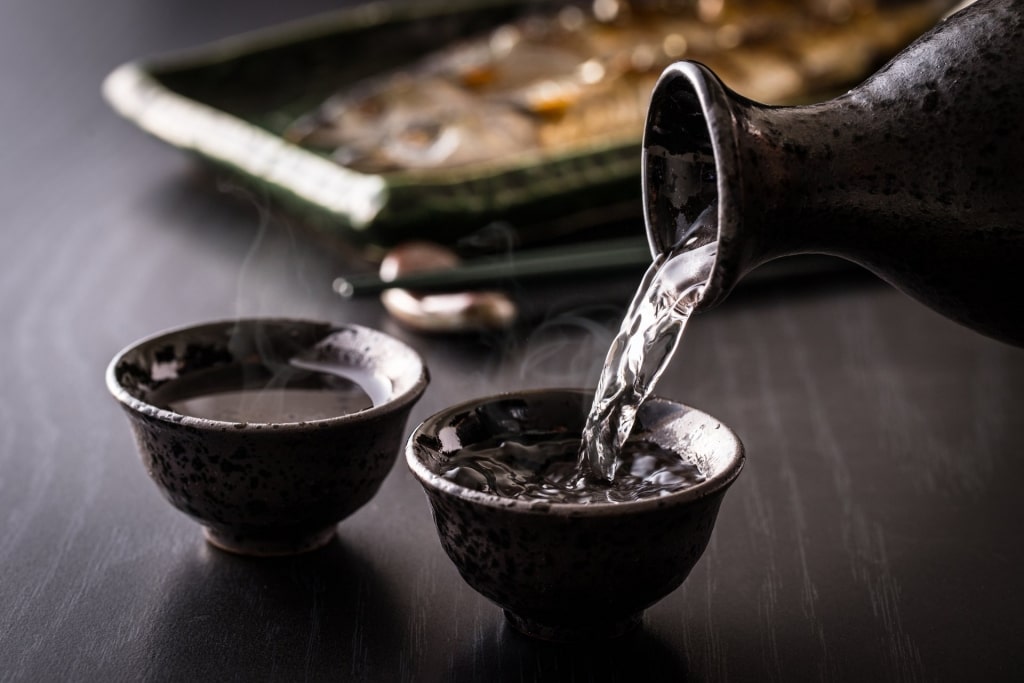
Sake
Sake, or rice wine, is one of the best things to buy in Japan. There are a host of meaningful traditions behind the science and art of sake. The country has been producing it since somewhere between 550 and 450 B.C.E., so it’s certainly a longstanding tradition.
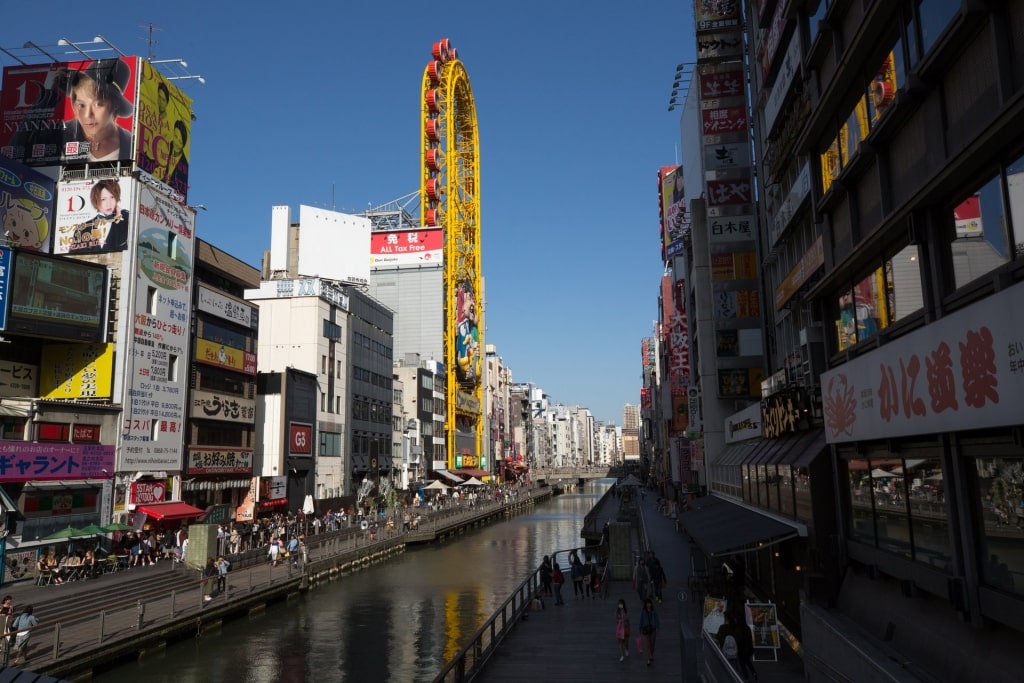
Dotonbori District, Kyoto
If you’re in the Kochi Prefecture, head to Nishioka Shuzoten, an over 200-year-old brewery where you can both taste and learn how to make sake—which is normally a closely guarded secret.
You should also try sake in a more casual setting, like an izakaya. Izakayas are casual Japanese bars serving small snacks along with beer and sake. You’ll find plenty of them as you stroll the streets of Japan’s major cities. Kyoto’s Dotonbori district is an especially great place for an evening food-and-sake-tasting stroll.
Read: Two Days in Kyoto
Geishas
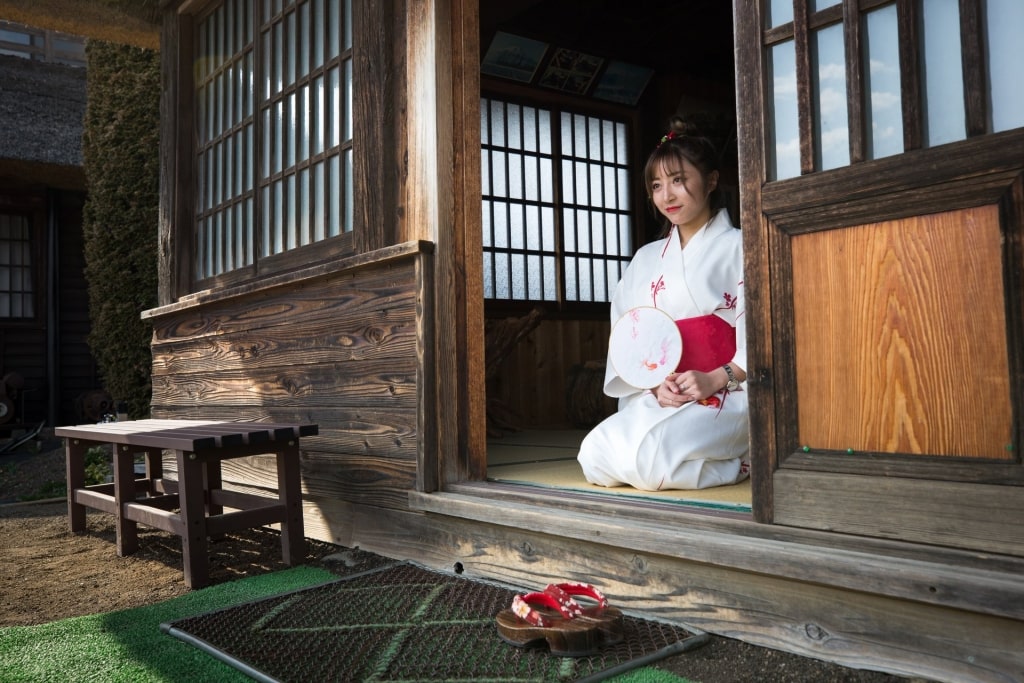
Geisha
A geisha is a skilled performer, artisan, and hostess. These women are trained in traditional Japanese arts and performances and provide entertainment at social gatherings and formal functions.
While dressed in traditional robes and sashes, geishas may recite poetry and play instruments, or demonstrate skills like origami or dance. Being a geisha requires a lifetime of study as well as knowledge on a massive variety of topics to ensure they can provide stimulating conversation.
Today, many geishas practice their skills for foreign guests rather than foreign dignitaries, as was often the case in the 13th to 19th centuries. Cities like Tokyo and Nagasaki offer evening performances paired with dinner for guests who want to experience geisha culture.
Mt. Fuji
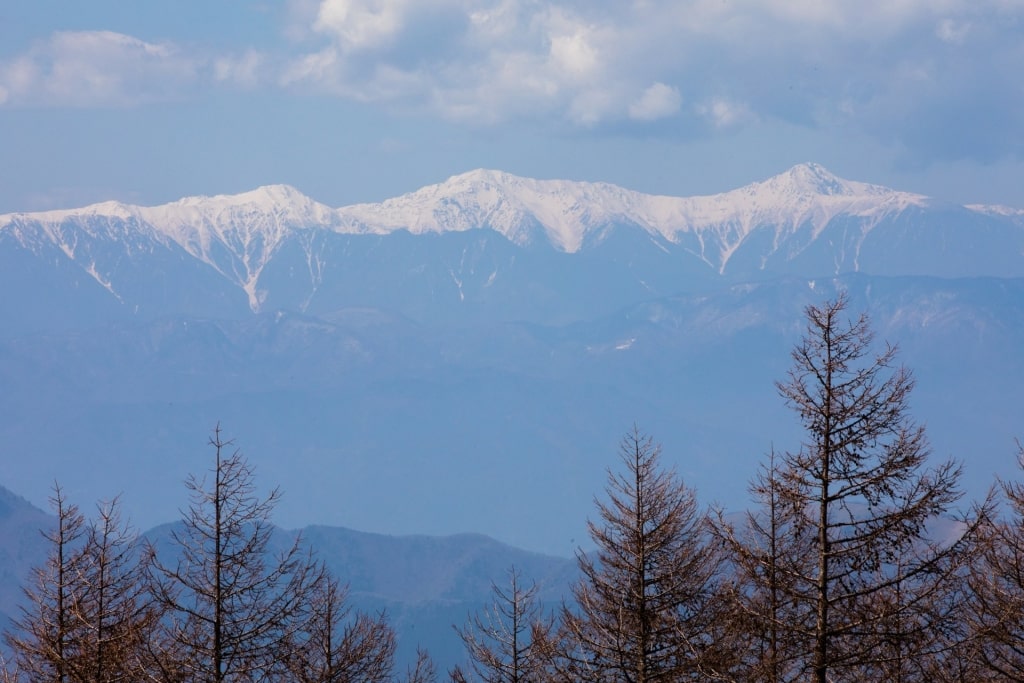
Mt. Fuji
The snow-covered volcano of Mount Fuji is an everlasting symbol of Japan. The mountain dominates the landscape and has served as the muse of many Japanese artists over the centuries.
While hiking Mount Fuji is difficult, to say the least, there are many ways to see the Japanese mountain and admire the views that have inspired creatives throughout Japan’s history.
The Komagatake Ropeway over Lake Ashi carries guests to the top of Mount Komagatake, which offers excellent views of Mount Fuji. Fuji itself is often shrouded in fog, which can make it even more beautiful in photos. The nearby Mt. Fuji World Heritage Center is a great stop for people who want to learn more about the cultural significance and natural history of the renowned Japanese landmark.
Innovation
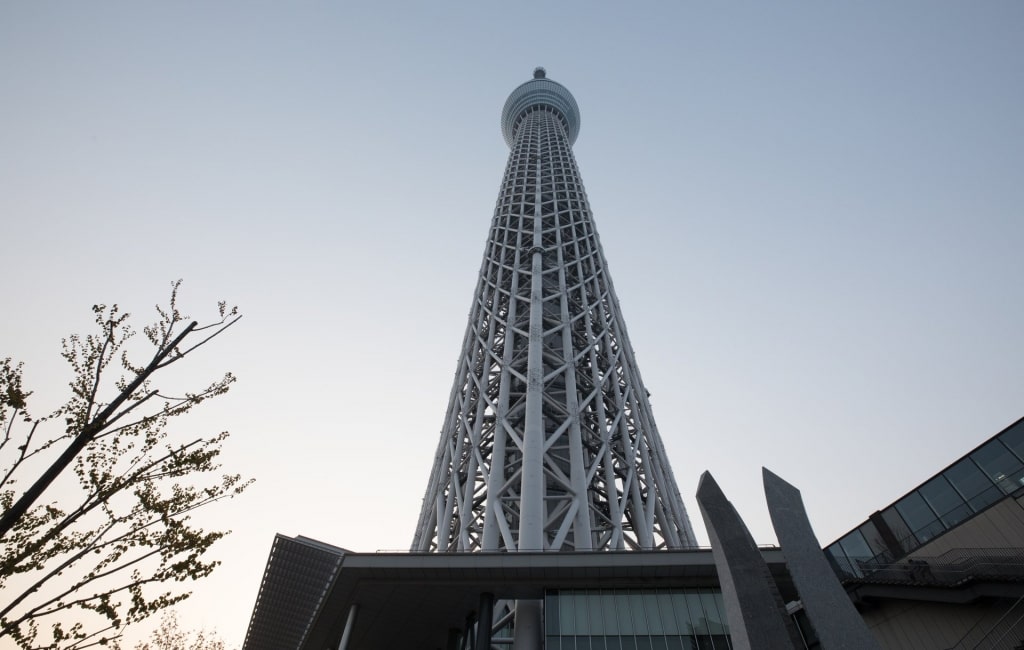
Tokyo Skytree
Japan is known for its neon lights, high-tech robots, and commitment to innovation and creativity. As one of the most technologically advanced countries on the planet, Japan is known for its automated systems and impressive marvels of modern engineering.
Japan’s tallest structure, the Tokyo Sky Tree, is a fantastic example of Japanese innovation. The contemporary building is earthquake proof thanks to a central core that can absorb most of the shock. The design was borrowed from ancient pagodas, which are also able to withstand heavy shaking.
To see even more innovative and futuristic architecture, visit Omotesando, one of the best neighborhoods in Tokyo, or the Kyushu National Museum, a curved steel and glass structure that blends into the landscape from a distance.
Read: Tokyo 3-Day Itinerary
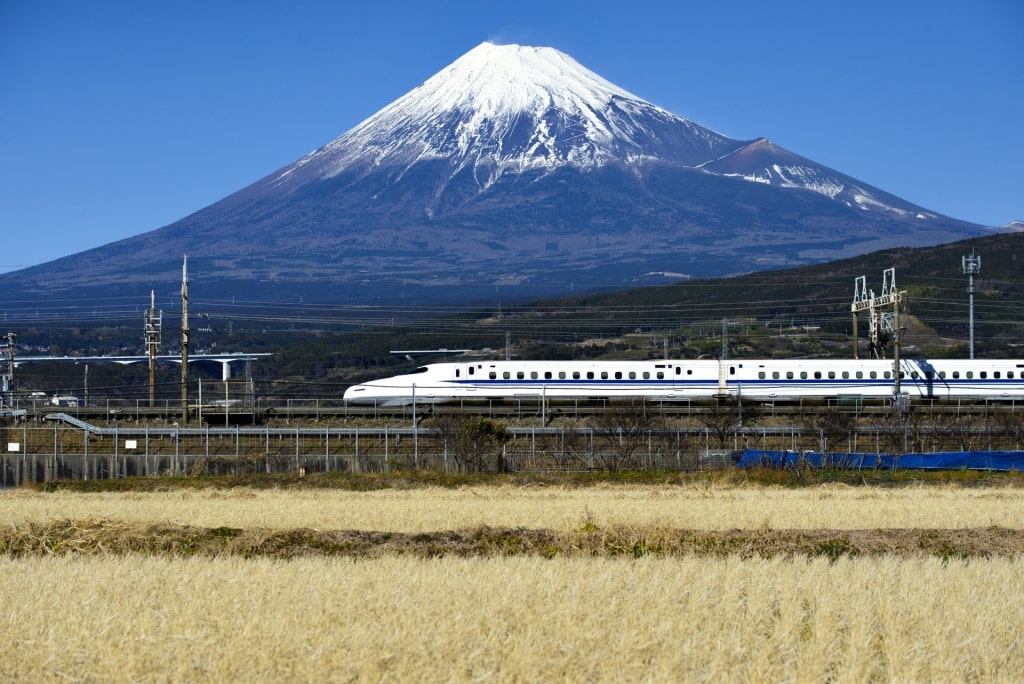
Tokaido Shinkansen
Throughout all cities (especially Tokyo), you’ll find massive multi-story arcades. Even if you don’t like games, take a minute to wander into one. It’s a sensory overload of color and flashing lights, sound, and brightly lit machines and gadgets that look equal parts futuristic and fun. You should also be prepared for technology to play a role in everything you do while visiting, from ordering your lunch at restaurants via a touch screen to riding one of the most efficient and on-time public transportation systems in the world.
Cherry Blossoms
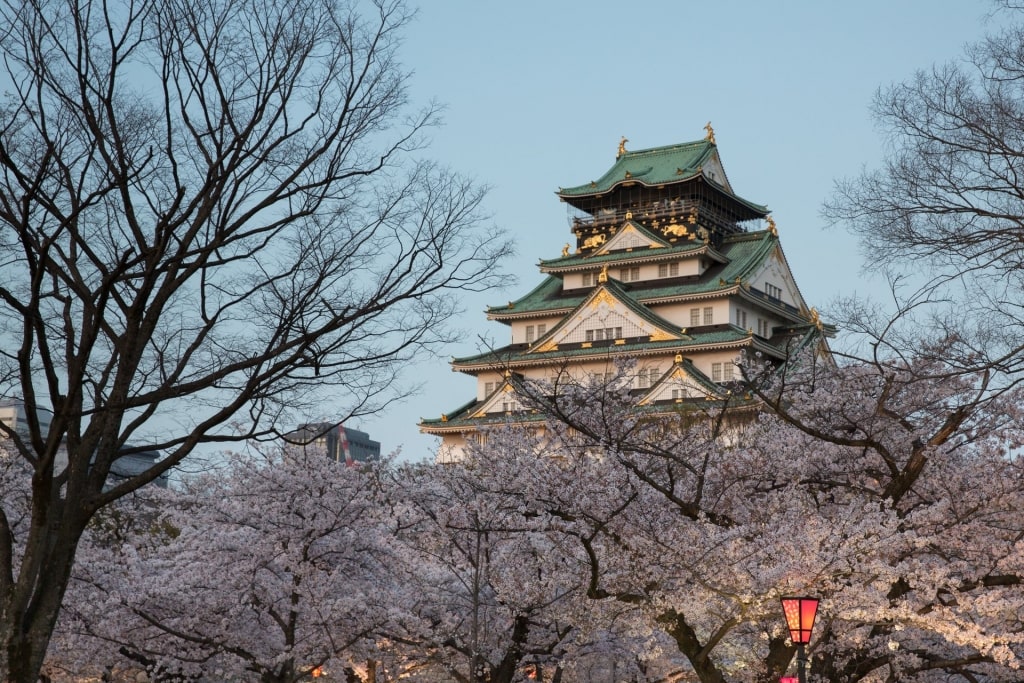
Osaka Castle
Perhaps the most iconic plant of Japan, cherry blossoms are found throughout the country in the spring. Celebrating the spring blooms is a tradition in Japan and has been for centuries, so many towns and villages throughout the country have their own cherry blossom festivals.
One of the most beautiful places in Japan, Osaka Castle is home to more than 600 trees in its Nishinomaru Garden, and since the castle lights up at night, you can see them late into the evening. If you’re closer to Fukuoka, you’ll find trees at the Fukuoka Castle Ruins, where you can stroll through huge canopies of cherry blossoms while exploring what was once a sprawling seat of political power.
Another peaceful location to walk below the trees is Chiran Peace Park in Kagoshima. The trees are almost 50 years old, and some are well over 20 feet tall.
Cherry blossoms abound in March and April, so you’ll likely be able to find a cluster of them no matter what city you’re in. The trees can adapt to varied climates, so you’ll find them in parks on the northern and southernmost islands.
Beautiful Landscapes
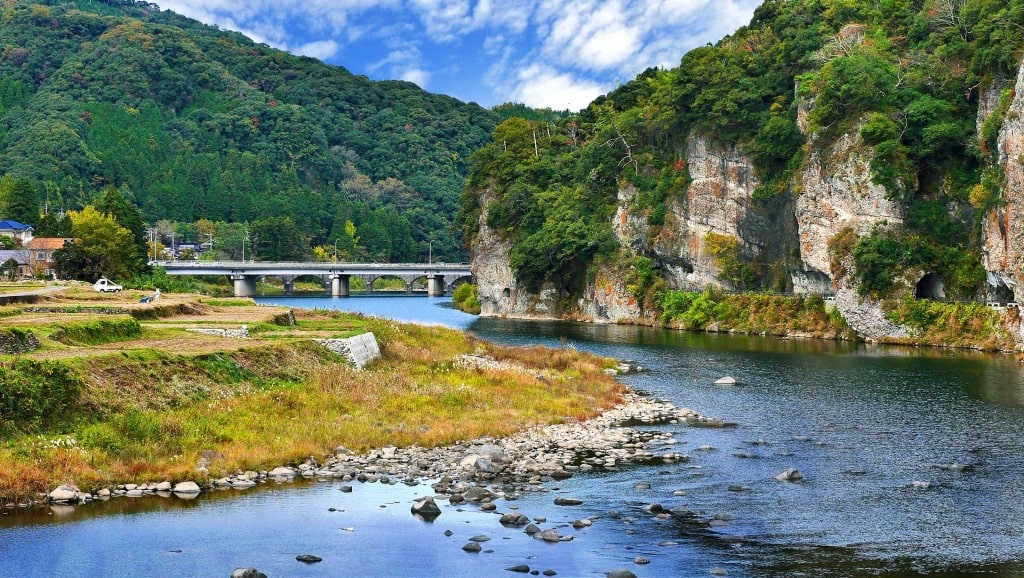
Yabakei Gorge, Kyushu
Though it’s a small country, Japan’s landscapes are extremely diverse, and range from snow-covered interior mountains to tropical cities in the southwest. As hard as it is to draw yourself away from the sights of destinations like Tokyo and Osaka, Japan is well known globally for these natural scenes.
One of the most beautiful areas in Japan is Yabakei Gorge, on the southernmost island of Kyushu. A charming town tucked into oceanfront cliffs, it’s extremely warm and lush. It’s near Beppu, home to the famous Blood Pond, a rare, naturally red hot spring. It’s one of several unique hot springs near the town.

Kabira Bay, Ishigaki
You might be surprised to learn that Japan’s landscapes aren’t just on land – the underwater world is amazing, too. Japan is seismically active, which creates underwater chasms and rock formations, as well as reef formations. In the southernmost part of the country, you can snorkel or take glass-bottom boat rides across reefs teeming with fish, coral, and sometimes larger creatures like manta rays and sea turtles.
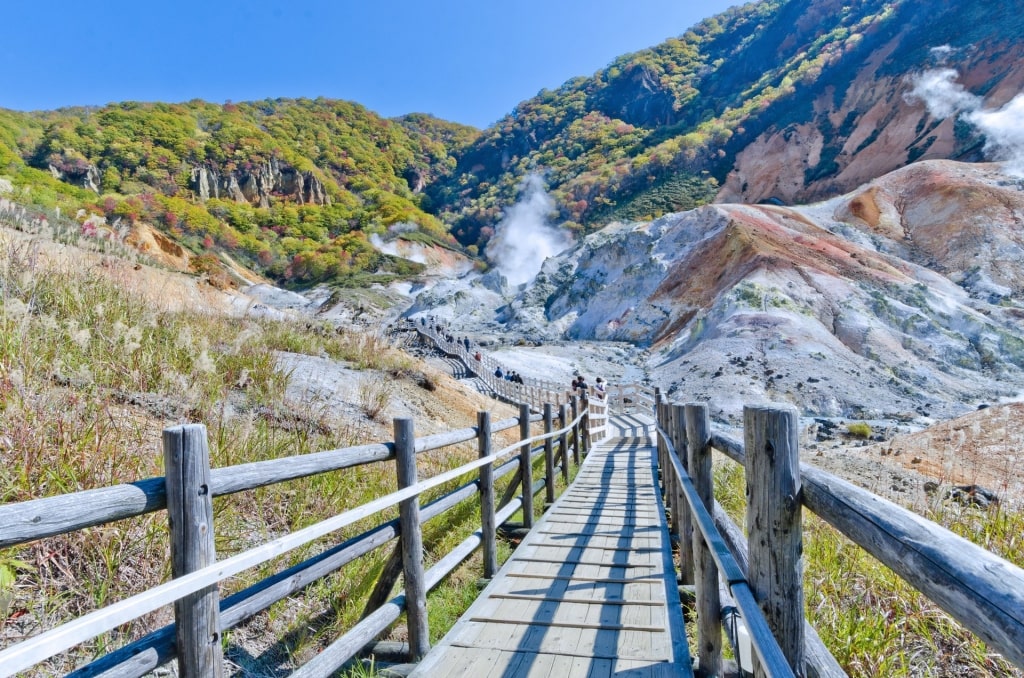
Hell Valley (Jigokudani), Noboribetsu
Other beautiful natural landscapes in Japan include Kobe’s Nunobiki Falls, Ryugado Cave in Kochi, the “Hell Valley” (Jigokudani) crater near Sapporo, and Mount Inasa in Nagasaki, where you can take a glass-walled cable car to the summit.
Gardens
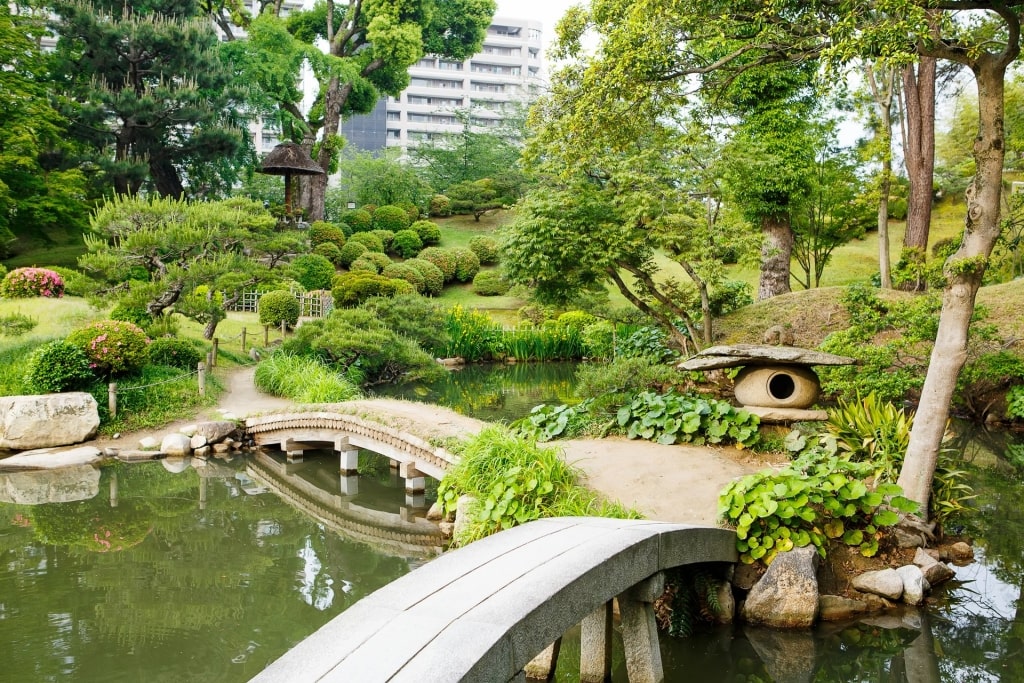
Shukkeien Garden, Hiroshima
One of the things Japan is most known for is its gardens, which range from koi ponds and bonsai gardens to dense gardens with oversized trees and secret tea houses. Some gardens are well-manicured and designed to complement the landscapes outside traditional homes, while others are public parks dotted with souvenir stands, temples, and modern art. Every city in Japan has at least a few gardens worth exploring.
In Hiroshima, the stunning Shukkeien Garden, built in 1620, features koi ponds, bridges, pagodas, and plants so vividly green you’ll think your eyes are playing tricks on you. Kobe’s Sorakuen Garden is a notable downtown garden that boasts beautiful views of the city.
Kagoshima’s Senganen Garden is a fabulous example of one initially built for private use outside a lavish home. The garden and home were built in the mid-1600s by a powerful political family and include everything from bonsai and bamboo pathways to meditative ponds and cherry trees.
Tea is, of course, one of the things Japan is most known for, and traditional tea ceremonies are usually held on tatami mats in gardens. In Hokokuji, outside Tokyo, you can participate in a traditional matcha tea ceremony in the bamboo gardens.
Sushi
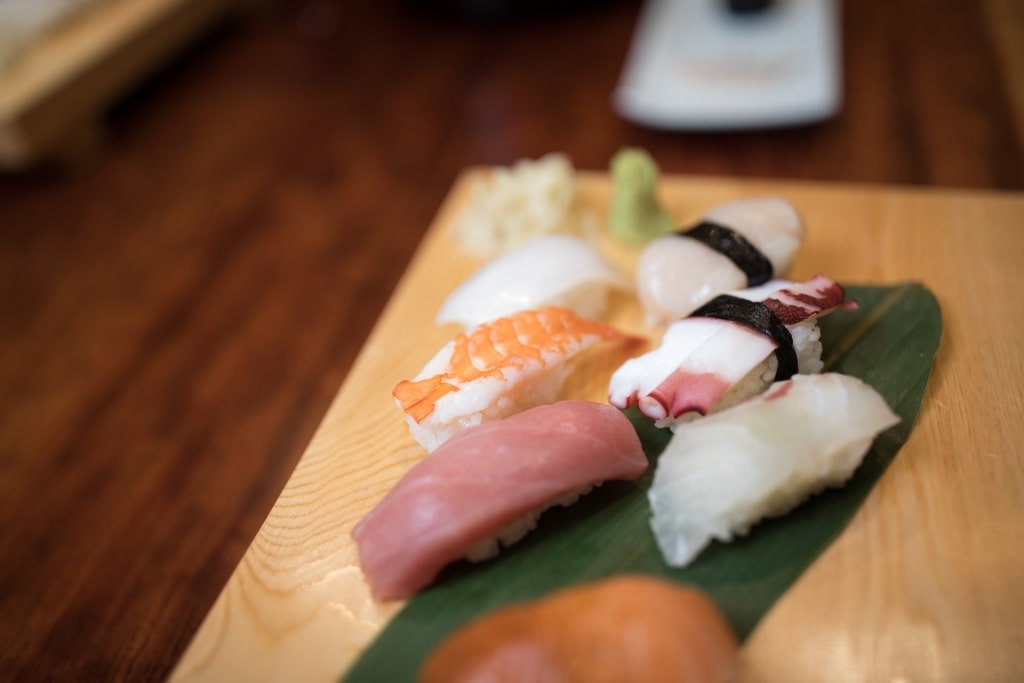
Nigiri
Japan is known for many famous foods, but its most well-known dish is sushi. Sushi goes back centuries—best guesses are that it originated around the year 400 C.E. By the year 1000 C.E., sushi had become a staple of formal Japanese cuisine.
In the 1800s, when Japan’s cities grew and workers needed a quick and affordable lunch, sushi changed, becoming something made quickly at food carts rather than a luxurious item reserved just for society’s upper echelon. Today, sushi options run the gambit, from speedy sushi boat restaurants to more elegant options with rare fish and expert sushi chefs preparing the dishes.
Sushi restaurants usually serve everything from hand rolls to nigiri (fish and rice only) to sashimi (fish only). Sushi doesn’t have to be raw, and it doesn’t even have to be fish—egg, tofu, and cooked options are readily available in most places.
Read: Best Beaches in Japan
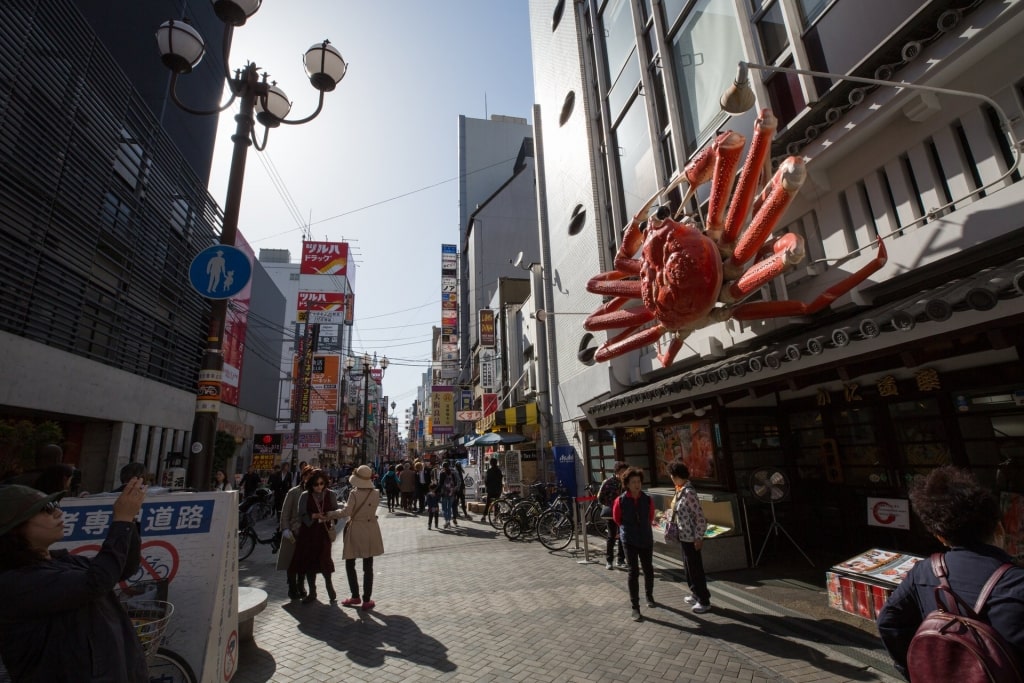
Dotonbori District, Kyoto
The best way to explore all of the cultural, historical, and natural elements that Japan is known for is on a cruise to Asia. On a cruise to Japan, you’ll visit multiple destinations in the country, each with its own unique flair.
Browse cruise itineraries on our website and book an unforgettable vacation to Asia today.
